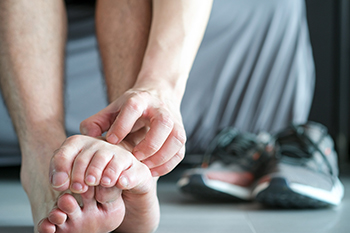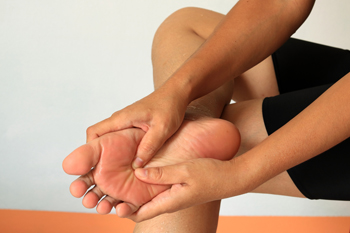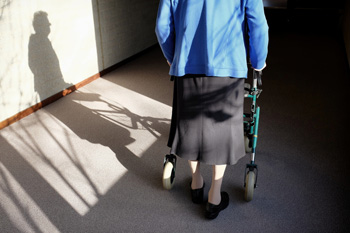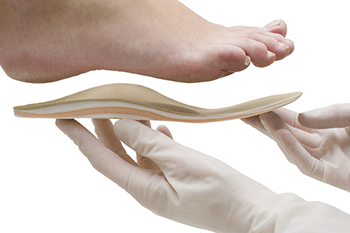Items filtered by date: July 2022
What Are Risk Factors for Athlete’s Foot?

Athlete’s foot is a pesky affliction of the foot that you may experience at some point in your life. The condition is a kind of fungal infection that is spread in warm, moist environments. Most typically, athlete’s foot can be spread to someone when they walk barefoot in highly-trafficked public areas where the fungus is present such as pool sides and locker rooms. There are several risk factors associated with athlete’s foot. First, if you are someone who usually wears damp or tight-fitting shoes, socks, or stockings, then you are increasing your risk of developing athlete’s foot. Wearing this kind of shoe or sock for prolonged periods can essentially trap the fungus, enabling it to thrive and wreak havoc on your feet. Additionally, if you are someone who suffers from persistently sweaty feet, then you may be at a greater risk of developing athlete’s foot. Those with conditions such as HIV-AIDS who have impaired immune systems are also particularly susceptible to suffering from athlete’s foot, as such individuals have a difficult time fighting off the fungus. If you identify with any of these risk factor groups, it might be a good idea to contact a podiatrist who can help ward off athlete’s foot.
Athlete’s foot is an inconvenient condition that can be easily reduced with the proper treatment. If you have any concerns about your feet and ankles, contact Patrick Bruton, DPM from Big Country foot and Ankle. Our doctor will treat your foot and ankle needs.
Athlete’s Foot: The Sole Story
Athlete's foot, also known as tinea pedis, can be an extremely contagious foot infection. It is commonly contracted in public changing areas and bathrooms, dormitory style living quarters, around locker rooms and public swimming pools, or anywhere your feet often come into contact with other people.
Solutions to Combat Athlete’s Foot
- Hydrate your feet by using lotion
- Exfoliate
- Buff off nails
- Use of anti-fungal products
- Examine your feet and visit your doctor if any suspicious blisters or cuts develop
Athlete’s foot can cause many irritating symptoms such as dry and flaking skin, itching, and redness. Some more severe symptoms can include bleeding and cracked skin, intense itching and burning, and even pain when walking. In the worst cases, Athlete’s foot can cause blistering as well. Speak to your podiatrist for a better understanding of the different causes of Athlete’s foot, as well as help in determining which treatment options are best for you.
If you have any questions please feel free to contact our offices located in Abilene, and Brownwood, TX . We offer the newest diagnostic and treatment technologies for all your foot and ankle needs.
How Diabetic Neuropathy Affects the Feet

Diabetic neuropathy is nerve damage that is primarily caused by diabetes. High levels of blood sugar over a long period can cause damage to the nerves. As diabetics age, their chances of developing this nerve damage increase. Harm to the nerves also can be caused by drinking too much alcohol. Neuropathy symptoms often show up in the feet, which because of the nerve damage may not feel pain. This leaves the diabetic at risk for developing ulcers from cuts or sores that are neglected. The nerves in the feet that normally detect pain, touch, and hot or cold do not function properly. This also causes weakness in the lower leg and foot muscles. It is recommended that diabetics check, or have someone check, their feet each day for sores, cuts, and bruises. Regular visits with a podiatrist, who can test the severity of the nerve damage and suggest the proper treatment options, are strongly suggested.
Neuropathy
Neuropathy can be a potentially serious condition, especially if it is left undiagnosed. If you have any concerns that you may be experiencing nerve loss in your feet, consult with Patrick Bruton, DPM from Big Country foot and Ankle. Our doctor will assess your condition and provide you with quality foot and ankle treatment for neuropathy.
What Is Neuropathy?
Neuropathy is a condition that leads to damage to the nerves in the body. Peripheral neuropathy, or neuropathy that affects your peripheral nervous system, usually occurs in the feet. Neuropathy can be triggered by a number of different causes. Such causes include diabetes, infections, cancers, disorders, and toxic substances.
Symptoms of Neuropathy Include:
- Numbness
- Sensation loss
- Prickling and tingling sensations
- Throbbing, freezing, burning pains
- Muscle weakness
Those with diabetes are at serious risk due to being unable to feel an ulcer on their feet. Diabetics usually also suffer from poor blood circulation. This can lead to the wound not healing, infections occurring, and the limb may have to be amputated.
Treatment
To treat neuropathy in the foot, podiatrists will first diagnose the cause of the neuropathy. Figuring out the underlying cause of the neuropathy will allow the podiatrist to prescribe the best treatment, whether it be caused by diabetes, toxic substance exposure, infection, etc. If the nerve has not died, then it’s possible that sensation may be able to return to the foot.
Pain medication may be issued for pain. Electrical nerve stimulation can be used to stimulate nerves. If the neuropathy is caused from pressure on the nerves, then surgery may be necessary.
If you have any questions, please feel free to contact our offices located in Abilene, and Brownwood, TX . We offer the newest diagnostic and treatment technologies for all your foot care needs.
Elderly Foot Care and Moisturizer

As an individual ages, it becomes increasingly important for them to take special care of their feet. This is because seniors tend to have feet that are more prone to dryness and inadequate blood circulation. Therefore, seniors ought to think critically about their daily foot care routine and how they are going about maintaining strong feet. One important component of a senior’s foot care routine is moisturizing the feet. Since seniors generally have drier feet than children and younger adults, choosing and applying the right foot moisturizer is essential. Keeping their feet hydrated can also help seniors prevent cracked heels and ward off potential infections. When applying moisturizer to the feet, a senior might be careful not to apply moisturizer that is too greasy, as this may put them at a greater risk of falling and tripping. A senior might also be mindful that standard moisturizers that have a pleasant fragrance sometimes fail to provide the needed hydration. Instead, seniors could select a heavy duty moisturizer that is not too greasy but can still sufficiently hydrate the skin. For more tips on how seniors can care for their feet, consider contacting a podiatrist.
Proper foot care is something many older adults forget to consider. If you have any concerns about your feet and ankles, contact Patrick Bruton, DPM from Big Country foot and Ankle. Our doctor can provide the care you need to keep you pain-free and on your feet.
The Elderly and Their Feet
As we age we start to notice many changes in our body, but the elder population may not notice them right away. Medical conditions may prevent the elderly to take notice of their foot health right away. Poor vision is a lead contributor to not taking action for the elderly.
Common Conditions
- Neuropathy – can reduce feeling in the feet and can hide many life-threatening medical conditions.
- Reduced flexibility – prevents the ability of proper toenail trimming, and foot cleaning. If left untreated, it may lead to further medical issues.
- Foot sores – amongst the older population can be serious before they are discovered. Some of the problematic conditions they may face are:
- Gouging toenails affecting nearby toe
- Shoes that don’t fit properly
- Pressure sores
- Loss of circulation in legs & feet
- Edema & swelling of feet and ankles
Susceptible Infections
Diabetes and poor circulation can cause general loss of sensitivity over the years, turning a simple cut into a serious issue.
If you have any questions please feel free to contact our offices located in Abilene, and Brownwood, TX . We offer the newest diagnostic and treatment technologies for all your foot and ankle needs.
We Can Treat Your Foot or Ankle Pain
Custom Orthotics Are So Much More Than an Ordinary Insole

Ordinary, over-the-counter insoles should not be confused with custom orthotics. Custom orthotics are prescription medical devices designed specifically to fit your individual feet and address your particular issue. Custom orthotics can help improve your gait, reduce pain, protect your joints, provide support, and enhance your athletic performance. They also can help to prevent injuries and improve alignment in your feet, which affects your entire body. Having custom orthotics made starts with a thorough examination from a podiatrist. They will then analyze your medical history and diagnose the cause of your pain or gait/mobility issue. If they determine that you can benefit from custom orthotics, they will create either a plaster mold or 3D digital scan of your feet from which your custom orthotics will be produced. Make an appointment with a podiatrist to explore whether custom orthotics are a good fit for you.
If you are having discomfort in your feet and would like to try orthotics, contact Patrick Bruton, DPM from Big Country foot and Ankle. Our doctor can provide the care you need to keep you pain-free and on your feet.
What Are Orthotics?
Orthotics are inserts you can place into your shoes to help with a variety of foot problems such as flat feet or foot pain. Orthotics provide relief and comfort for minor foot and heel pain but can’t correct serious biomechanical problems in your feet.
Over-the-Counter Inserts
Orthotics come in a wide variety of over-the-counter inserts that are used to treat foot pain, heel pain, and minor problems. For example, arch supports can be inserted into your shoes to help correct overarched or flat feet, while gel insoles are often used because they provide comfort and relief from foot and heel pain by alleviating pressure.
Prescription Orthotics
If over-the-counter inserts don’t work for you or if you have a more severe foot concern, it is possible to have your podiatrist prescribe custom orthotics. These high-quality inserts are designed to treat problems such as abnormal motion, plantar fasciitis, and severe forms of heel pain. They can even be used to help patients suffering from diabetes by treating foot ulcers and painful calluses and are usually molded to your feet individually, which allows them to provide full support and comfort.
If you are experiencing minor to severe foot or heel pain, it’s recommended to speak with your podiatrist about the possibilities of using orthotics. A podiatrist can determine which type of orthotic is right for you and allow you to take the first steps towards being pain-free.
If you have any questions please contact our offices located in Abilene, and Brownwood, TX . We offer the newest diagnostic and treatment technologies for all your foot and ankle needs.

